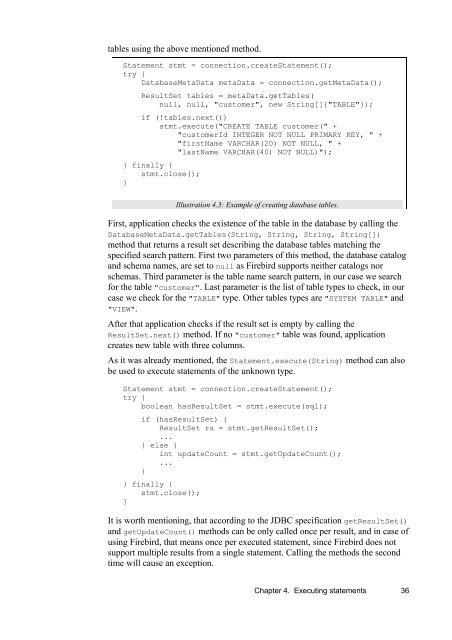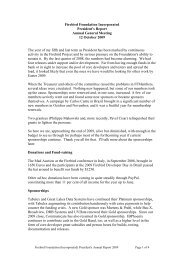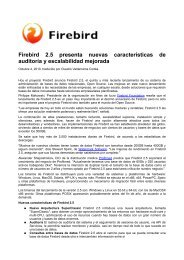Jaybird 2.1 JDBC driver Java Programmer's Manual - Firebird
Jaybird 2.1 JDBC driver Java Programmer's Manual - Firebird
Jaybird 2.1 JDBC driver Java Programmer's Manual - Firebird
Create successful ePaper yourself
Turn your PDF publications into a flip-book with our unique Google optimized e-Paper software.
tables using the above mentioned method.<br />
Statement stmt = connection.createStatement();<br />
try {<br />
DatabaseMetaData metaData = connection.getMetaData();<br />
ResultSet tables = metaData.getTables(<br />
null, null, "customer", new String[]{"TABLE"});<br />
if (!tables.next())<br />
stmt.execute("CREATE TABLE customer(" +<br />
"customerId INTEGER NOT NULL PRIMARY KEY, " +<br />
"firstName VARCHAR(20) NOT NULL, " +<br />
"lastName VARCHAR(40) NOT NULL)");<br />
} finally {<br />
stmt.close();<br />
}<br />
Illustration 4.3: Example of creating database tables.<br />
First, application checks the existence of the table in the database by calling the<br />
DatabaseMetaData.getTables(String, String, String, String[])<br />
method that returns a result set describing the database tables matching the<br />
specified search pattern. First two parameters of this method, the database catalog<br />
and schema names, are set to null as <strong>Firebird</strong> supports neither catalogs nor<br />
schemas. Third parameter is the table name search pattern, in our case we search<br />
for the table "customer". Last parameter is the list of table types to check, in our<br />
case we check for the "TABLE" type. Other tables types are "SYSTEM TABLE" and<br />
"VIEW".<br />
After that application checks if the result set is empty by calling the<br />
ResultSet.next() method. If no "customer" table was found, application<br />
creates new table with three columns.<br />
As it was already mentioned, the Statement.execute(String) method can also<br />
be used to execute statements of the unknown type.<br />
Statement stmt = connection.createStatement();<br />
try {<br />
boolean hasResultSet = stmt.execute(sql);<br />
if (hasResultSet) {<br />
ResultSet rs = stmt.getResultSet();<br />
...<br />
} else {<br />
int updateCount = stmt.getUpdateCount();<br />
...<br />
}<br />
} finally {<br />
stmt.close();<br />
}<br />
It is worth mentioning, that according to the <strong>JDBC</strong> specification getResultSet()<br />
and getUpdateCount() methods can be only called once per result, and in case of<br />
using <strong>Firebird</strong>, that means once per executed statement, since <strong>Firebird</strong> does not<br />
support multiple results from a single statement. Calling the methods the second<br />
time will cause an exception.<br />
Chapter 4. Executing statements 36
















